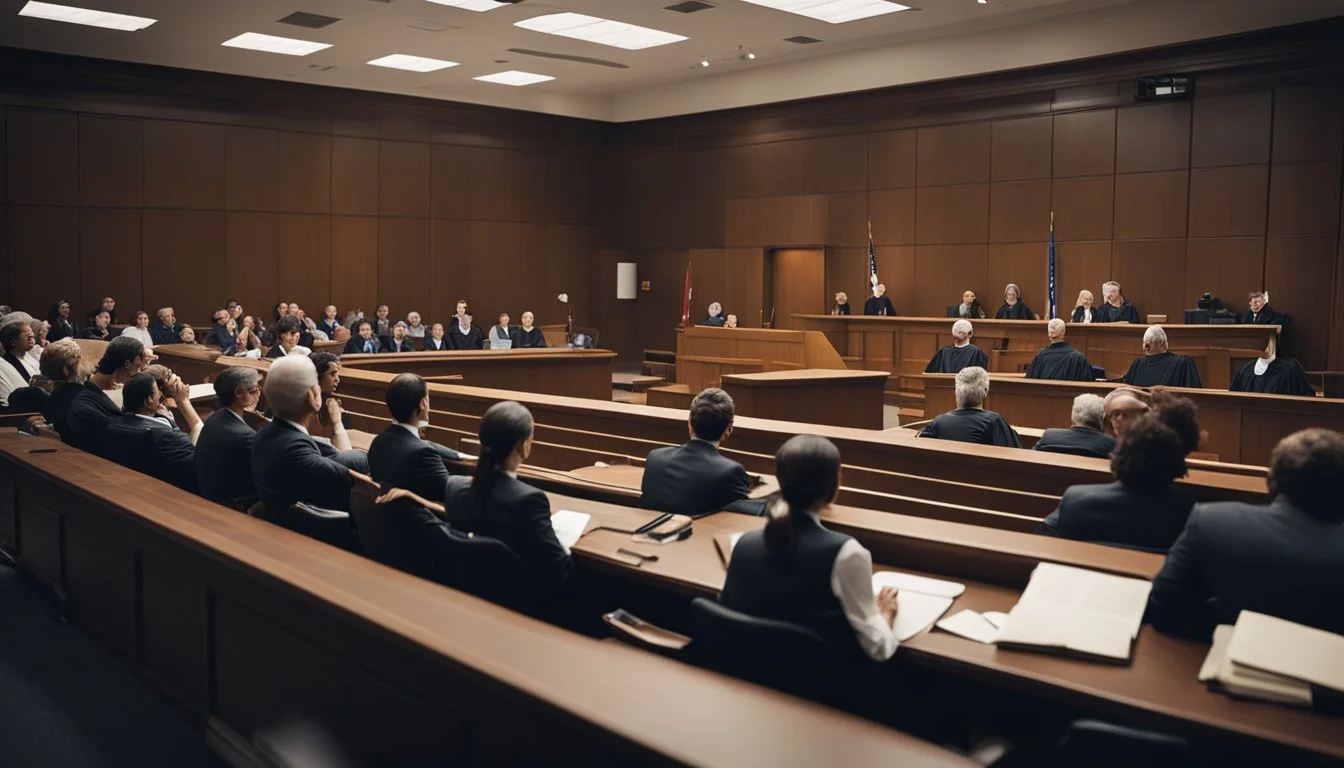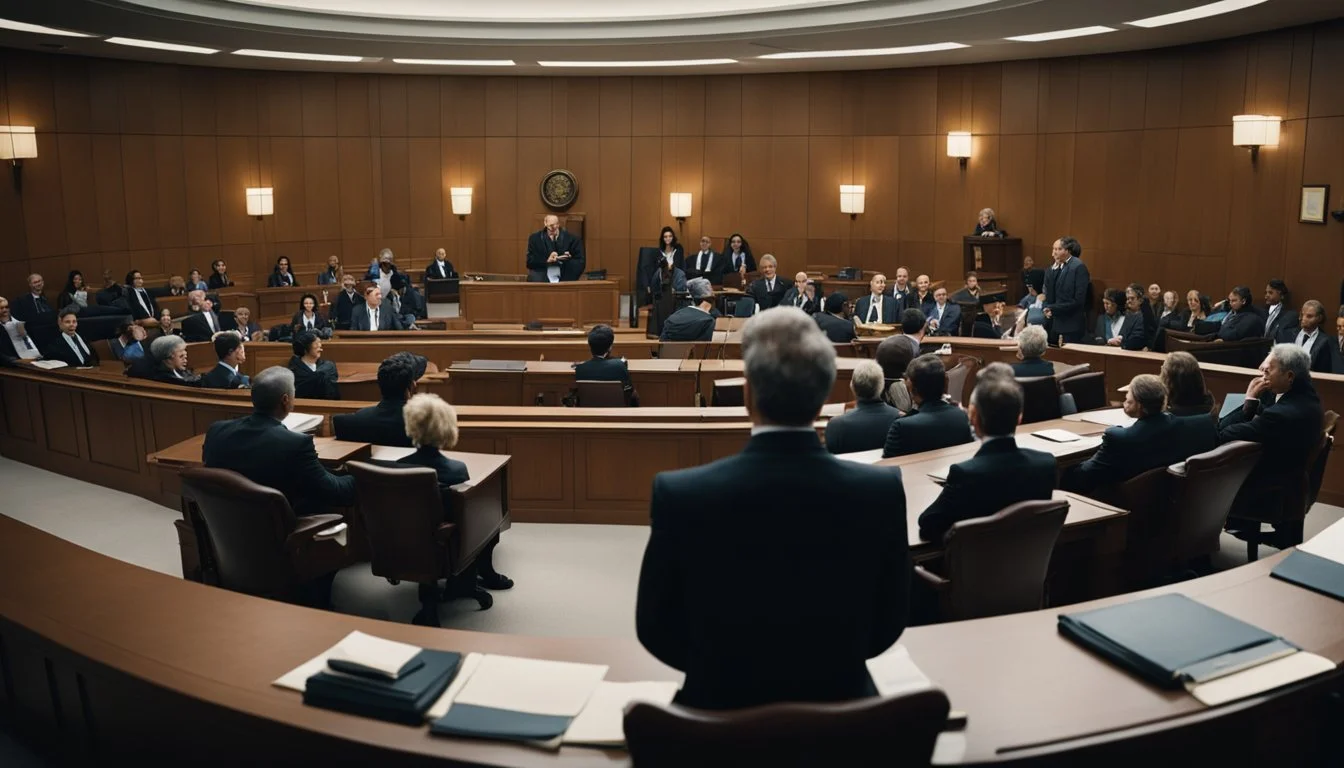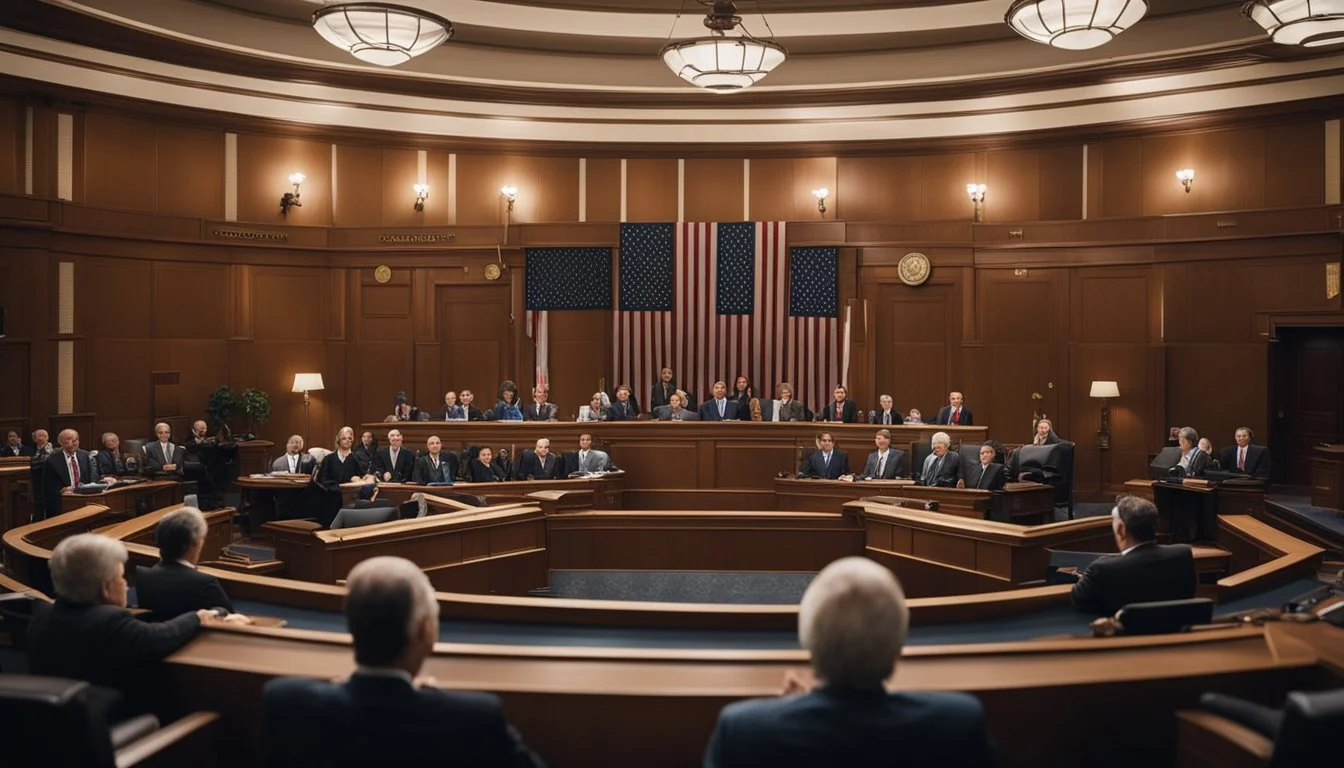12 Films About Political Impeachments
A Riveting Look at History
Political impeachments have long been a pivotal aspect of governmental accountability, deeply influencing the political landscape and public perception of leadership. Films that explore this topic delve into the complexities of power, justice, and the often turbulent political environment that surrounds impeachment processes. These films provide insight into the legal and ethical challenges faced by political figures, highlighting the gravity of impeachment as a tool for maintaining integrity in governance.
Audiences are often captivated by the dramatic tension and real-world implications that come with cinematic portrayals of political impeachments. Through storytelling, these films offer a lens to understand the motivations, conflicts, and resolutions that shape such critical moments in political history. By exploring these narratives, viewers gain a richer comprehension of the stakes involved and the impact of impeachment on both individuals and the broader political system.
1) The Post (2017)
The Post (2017) is a political thriller directed by Steven Spielberg.
The film focuses on The Washington Post's decision to publish the Pentagon Papers.
Meryl Streep stars as Katharine Graham, the paper's publisher.
Tom Hanks plays Ben Bradlee, the executive editor of The Washington Post.
The film highlights the challenges faced by the newspaper in exposing government secrets.
The Pentagon Papers were classified documents about the Vietnam War.
The decision to publish involved significant legal risks and ethical considerations.
The Post portrays the tension between the press and the government.
It underscores the importance of a free and independent press in a democracy.
For more information, visit IMDB.
2) All the President's Men (1976)
"All the President's Men" (1976) is a significant film about the Watergate scandal, which led to the impeachment and resignation of President Richard Nixon. The movie is directed by Alan J. Pakula and is based on the non-fiction book of the same name by journalists Carl Bernstein and Bob Woodward.
Dustin Hoffman and Robert Redford star as Bernstein and Woodward, respectively. Their investigative work at The Washington Post is the focus, depicting their meticulous efforts in uncovering the details of one of the most notorious political scandals in American history.
The film highlights the crucial role of journalism in holding political figures accountable. It portrays the intense pressure and challenges faced by the reporters as they navigate through layers of deception and cover-ups.
"All the President's Men" received widespread acclaim for its gripping narrative and strong performances. It earned eight Academy Award nominations, further cementing its status as a cornerstone in political and journalistic cinema.
For more information, visit IMDb, or Wikipedia.
3) Frost/Nixon (2008)
"Frost/Nixon" is a historical drama directed by Ron Howard. The film is adapted from Peter Morgan's 2006 play, which portrays the 1977 post-Watergate interviews between David Frost and Richard Nixon.
Frank Langella stars as Nixon, while Michael Sheen plays Frost. Their performances are widely hailed for their depth and accuracy.
The film dramatizes how British talk-show host Frost secured the interviews, determined to confront Nixon about his role in the Watergate scandal.
Despite doubts from critics about Frost's capability to challenge Nixon, the interviews led to a significant moment in television history. Nixon's admissions during the interviews marked a rare moment of accountability.
"Frost/Nixon" is recognized for its compelling narrative and powerful acting. The movie combines historical events with strong character studies to create a gripping story.
For more information about the film, visit the IMDb page.
4) Recount (2008)
"Recount" is a political drama television film released in 2008. Directed by Jay Roach and written by Danny Strong, it portrays the events surrounding Florida's vote recount during the 2000 U.S. Presidential election.
The film stars notable actors such as Kevin Spacey, Bob Balaban, Ed Begley Jr., Laura Dern, and John Hurt. It sheds light on the intense legal battles and political maneuverings that took place during this critical period.
"Recount" delves into the complexities of the election process, highlighting the controversies and discrepancies in the voting counts. The narrative focuses on both Democratic and Republican efforts to secure victory in the highly contested state of Florida.
The film's strength lies in its ability to create suspense and drama, even though the outcome of the election is well-known. It received positive reviews for its engaging storytelling and strong performances by the cast.
For more information about "Recount," visit Wikipedia or IMDB.
5) Primary Colors (1998)
Primary Colors (1998) is a comedy-drama film directed by Mike Nichols. The screenplay, written by Elaine May, is based on the novel Primary Colors: A Novel of Politics by journalist Joe Klein. The novel was initially published anonymously and is a roman à clef centered on Bill Clinton's 1992 presidential campaign.
The plot follows Henry Burton, played by Adrian Lester, a young African-American political idealist. Burton is recruited to join the campaign of Jack Stanton, a charismatic governor seeking the Democratic Party nomination for President.
John Travolta stars as Jack Stanton, with Emma Thompson portraying his ambitious wife, Susan Stanton. The film also includes performances by Billy Bob Thornton and Kathy Bates, adding to the strong ensemble cast.
Primary Colors offers a satirical look at the complexities and moral ambiguities of political life. Through sharp dialogue and keen observations, the film explores themes of loyalty, power, and the personal sacrifices involved in a presidential campaign.
For more details on Primary Colors, please visit Wikipedia.
6) The Contender (2000)
"The Contender" (2000) is an American political drama directed by Rod Lurie. It explores the political upheavals following the President's selection of a new Vice President, played by Joan Allen.
The film stars Jeff Bridges as the fictional President, along with Gary Oldman and Christian Slater in significant roles. Jeff Bridges' character appoints Senator Laine Hanson (Joan Allen) as Vice President after the death of the sitting Vice President.
The storyline delves into the intense scrutiny and smear campaigns that follow Hanson's nomination. Controversial elements from her past emerge, creating a turbulent confirmation process.
This film is seen as a response to the Lewinsky scandal involving President Bill Clinton, highlighting the manipulation and challenges in American political arenas.
More details can be found on IMDb.
7) Wag the Dog (1997)
"Wag the Dog" (1997) presents a sharp political satire directed by Barry Levinson. The film stars Robert De Niro as Conrad Brean, a spin doctor, and Dustin Hoffman as Stanley Motss, a Hollywood producer.
The plot revolves around these two characters fabricating a war to distract the public from a presidential scandal. Much of the film focuses on their manipulative tactics to sway public opinion.
The film highlights the power of media and political manipulation. It delves into the lengths to which political figures might go to preserve their image.
"Wag the Dog" is based on Larry Beinhart's novel "American Hero." The movie has gained attention for its clever dialogue and realistic portrayal of political subterfuge.
For more information, visit the IMDb page for "Wag the Dog."
8) The American President (1995)
"The American President" is a 1995 political romantic comedy-drama directed by Rob Reiner and written by Aaron Sorkin.
The film stars Michael Douglas as President Andrew Shepherd, a widower who strikes up a romantic relationship with environmental lobbyist Sydney Ellen Wade, played by Annette Bening. This relationship unfolds during Shepherd's reelection campaign, adding layers of complexity to his political and personal life.
Martin Sheen and Michael J. Fox deliver notable performances in supporting roles. The film uniquely blends romance, comedy, and political drama without focusing directly on impeachment. Nevertheless, it explores the intersection of personal relationships and political maneuvering in the highest office.
For more information, visit The American President (1995) on IMDb.
9) Charlie Wilson's War (2007)
Charlie Wilson's War (2007) is a biographical comedy-drama film directed by Mike Nichols and written by Aaron Sorkin. It stars Tom Hanks as Congressman Charlie Wilson, who is known for his involvement in supporting Afghan mujahideen during the Soviet-Afghan War.
The film showcases the efforts of Charlie Wilson and CIA operative Gust Avrakotos, played by Philip Seymour Hoffman. Their collaboration leads to Operation Cyclone, a covert program that significantly impacted the Soviet Union's withdrawal from Afghanistan in 1989.
Actors Julia Roberts and Amy Adams also play key roles, adding depth to the narrative. The film provides insight into the political and strategic maneuvers behind the scenes of a major Cold War conflict.
For more information on Charlie Wilson's War, visit Wikipedia or IMDB.
10) Mr. Smith Goes to Washington (1939)
Directed by Frank Capra, "Mr. Smith Goes to Washington" is a key film about political idealism and integrity. James Stewart stars as Jefferson Smith, an honest and naive man appointed as a United States senator.
Smith faces widespread corruption in Washington D.C. He stands firm against it, becoming a symbol of honesty and perseverance.
The film features stellar performances by James Stewart, Jean Arthur, and Claude Rains. It highlights the challenges of standing up against entrenched political corruption.
"Mr. Smith Goes to Washington" remains an enduring film about the power of individual conviction in politics.
11) The Front (1976)
"The Front" (1976) is a drama film set during the era of the Hollywood blacklist in the 1950s.
Directed by Martin Ritt and written by Walter Bernstein, the film stars Woody Allen, Zero Mostel, and Michael Murphy.
Woody Allen, in a rare dramatic role, plays a cashier who fronts for blacklisted writers.
The story follows his evolution from an innocent stand-in to someone who grasps the injustice of the era.
The film sheds light on the lives of artists ostracized for alleged Communist ties or sympathies.
The cast and crew, including Bernstein and Ritt, had personal experiences with blacklisting, adding authenticity to the narrative. Though it has comedic elements, the film remains a poignant portrayal of a dark time in American entertainment history.
More about The Front (1976) on Wikipedia
More about The Front (1976) on IMDb
12) The Ides of March (2011)
The Ides of March, directed by George Clooney, is a political drama that offers a gritty look into the backroom machinations of a presidential campaign. Starring Ryan Gosling and George Clooney, it presents a narrative centered around the moral compromises and ethical conflicts faced by those in the cutthroat world of politics.
Ryan Gosling plays Stephen Meyers, a young yet seasoned campaign staffer who works for Governor Mike Morris, portrayed by George Clooney. His idealistic view of politics is shattered as he navigates the betrayal and deceit that pervades the campaign trail.
Philip Seymour Hoffman and Paul Giamatti deliver powerful performances as rival campaign managers, adding depth to the film's exploration of loyalty and corruption. The story escalates as Meyers' involvement with an intern, played by Evan Rachel Wood, leads to significant ethical dilemmas and political fallout.
The Ides of March effectively captures the intensity and moral ambiguity that can surround political campaigns. With its strong cast and compelling storyline, it provides a thought-provoking commentary on the nature of political power.
For more information on The Ides of March, visit IMDb.
Historical Context of Political Impeachments
Impeachment is a tool deeply rooted in historical precedent, tracing its origins back to English law and evolving significantly within the United States framework. The examination of early examples and the subsequent development of impeachment laws highlights its importance in maintaining governmental accountability.
Early Examples of Impeachment
The concept of impeachment originated in England during the 14th century. Parliament utilized this process to hold the king's ministers and other officials accountable for misconduct. Notable early cases include the impeachment of William Latimer and Richard Lyons in 1376 for corruption.
This tradition carried over to America. In 1797, William Blount became the first U.S. official to be impeached. Accused of conspiring to incite Native American tribes, he was expelled from the Senate but not convicted. This instance marked the beginning of America's unique approach to impeachment.
Evolution of Impeachment Laws
American colonies adapted their own impeachment practices, initially mirroring those of England. However, with the establishment of the U.S. Constitution in 1787, the Framers delineated specific guidelines. Article I grants the House of Representatives the sole power of impeachment, while the Senate holds the power to try all impeachments.
The basis for impeachment was defined in Article II as "Treason, Bribery, or other high Crimes and Misdemeanors." This standard has evolved through practice, influencing significant cases such as the impeachments of Andrew Johnson, Richard Nixon, and Bill Clinton. These cases underscore the balance between legal and political implications in impeachment proceedings.
The Legal Framework of Impeachment Processes
The impeachment process is governed both by constitutional provisions and judicial interpretations. These elements outline the authority and limitations associated with this critical political action.
Constitutional Provisions
Impeachment in the United States is rooted in the Constitution. The document grants Congress the power to impeach federal officials. Article I, Section 2 assigns the House of Representatives the sole authority to impeach, while Article I, Section 3 grants the Senate the power to try impeachments.
The standards for impeachment are detailed in Article II, Section 4, which states that the President, Vice President, and all civil Officers can be impeached for "Treason, Bribery, or other high Crimes and Misdemeanors." This clause is designed to ensure accountability at the highest levels of government.
Judicial Interpretations
While impeachment is a political process, judicial interpretations provide clarity on ambiguous constitutional questions. For example, the U.S. Supreme Court’s decision in Nixon v. United States clarified that impeachment trials are solely the Senate’s responsibility and not subject to judicial review.
Judicial interpretations also address the meaning of "high Crimes and Misdemeanors." Historically, this phrase encompasses not only criminal acts but also serious breaches of public trust. Courts have affirmed that the term grants Congress broad discretion, focusing on protecting the integrity of government.






